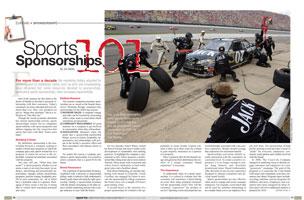
For more than a decade, the marketing dollars adjusted for inflation spent on traditional media such as print and broadcasting have remained flat while resources donated to sponsorships, particularly sports sponsorships, has increased exponentially.
One of the reasons for this trend is the desire of brands to develop a personal relationship with their customers. Today's consumers are more educated and more affluent than ever. They view products not just as "things they purchase" but as a reflection of "who they are."
Though the recent economic downturn has slowed sponsorship activity, sports sponsorships remain hot as companies spend millions with sports properties and athletes tapping into the connection that sports fans have with their "home town team."
Breaking it Down
By definition, sponsorship is the relationship between a company seeking to market a brand and a property in which the company pays cash and/or in-kind fee to a property in return for access to the exploitable commercial potential associated with the property.
You may still ask, "What does that mean?" A sports property, whether it is an arena, a team or event has assets: its audience, advertising and promotional opportunities, signage, tickets, promotions, programs, premier seating, hospitality, profile in your community, etc., all which have a potential value to a sponsor. Packaging of these assets is the key to being able to exploit their maximum potential and value.
Endless Reasons
The reasons companies purchase sponsorships are as varied as the brands themselves. Primarily, though, companies buy sponsorships for the following reasons:
Increase sales. A company's image and sales can be boosted by associating with a venue, team or event about which consumers are passionate.
Community involvement. It's good business for a company to get involved in communities where they sell products.
Association. Sponsors enjoy the perks that a sponsorship partnership brings: access to tickets, hospitality opportunities, and relationships with people in the facility's executive office and their association with famous artists or attractions.
No matter the reason a company purchases a sports sponsorship, it is crucial to select a property that is a good fit for the brand.
Brand Resonance
The explosion of sponsorship inventory combined with a decrease in sponsorship dollars make it critical to fully understand a brand's goals when selecting the right sponsorship. Ideally, a sponsorship resonates with the brand's messaging in all other aspects of their marketing and provides a target audience in sync with the brand.
 |
| One of the best examples of an effective brand/sports property partnership has been the Jack Daniel's brand sponsorship of NASCAR and Professional Bull Riding. |
For two decades, Fetzer Wines, owned by Brown Forman, has been a leader in the development of sustainable wine making practices. To highlight the company's commitment to this, Fetzer sponsors a professional bike riding team and several outdoor festivals. These assets work to promote and reflect Fetzer's dedication to hard work, great wines, and a healthier planet.
Red Moon Marketing, an outside marketing firm based in Charlotte, North Carolina, was engaged by Fetzer to activate the sponsorship by telling consumers the Fetzer story over a sample of Fetzer's great tasting wines.
A second factor in the selection of a proper sponsorship for a brand is the opportunity to create loyalty. Experts estimate it takes up to three years for a brand to gain majority awareness as a sponsor of a property.
Once a property that fits the brand's image and goals has been determined, the creation of a unique consumer "brand experience" is necessary.
The Experience
To understand value of a sports sponsorship it is critical to evaluate how the consumer will experience a brand during an event. How many potential customers will the sponsorship reach? How will the consumer "experience" the product or service? Sporting events and properties are overwhelmingly associated with a fun, positive experience. Brands should leverage that experience for maximum benefit.
Sponsorships activation should include interaction with the consumers on a personal level. To create a positive experience, it is no longer enough to simply hang banners and distribute promotional items. Brand Ambassadors offer the kind of one-on-one experience designed to educate consumers and develop brand loyalty.
Sports sponsorships are also effective when used to engage and excite company employees. For example, event tickets that can be used for customer entertaining or as a simple thank you to an employee for a job well done. The sponsorship of high profile sporting events provides a sense of "pride" for everyone: employees, consumers, trade partner and vendors involved with the brand.
In 2008, The Coca-Cola Company changed its marketing focus to directly engage customers and employees in a new "grassroots" campaign. The goal of the program is to associate the Coke brand with issues and community activities consumers care about. Program topics include: recycling, nutrition, exercise programs for children, and more. Employees and consumers have been energized by these efforts and a roll out to additional markets is planned for 2010.
Strategic Partnerships
A successful sponsorship is a win/win for both the brand and the property. With any successful partnership, each party has certain responsibilities.
It is the brand manager's responsibility to assess and develop programs that gain maximum exposure for the brand with its sponsorship. Elements for these programs should include research, product education and consistent evaluations. The sports property should make recommendations based on asset inventory, fan feedback and incremental promotional opportunities. It is also the responsibility of the sports property to provide timely updates on contract deliverables.
One of the best examples of an effective brand/sports property partnership has been the Jack Daniel's brand sponsorship of NASCAR and Professional Bull Riding. Signage, research, employee education and customer hospitality have all been key elements in ensuring the value of the sponsorships. A major asset used to engage consumers is the Jack Daniel's Experience (JDX).
Developed and coordinated by Jack Daniel's sponsorship managers and activated by Red Moon Marketing, the JDX brings the town of Lynchburg, Tennessee, the home of the Jack Daniel's Distillery, to consumers. Jack Daniel's, a world-renowned brand has a truly unique story and the JDX delivers the message in a controlled environment.
In addition to bringing a little bit of Lynchburg to consumers, the JDX is used to collect consumer data, create a branding experience, promote responsibility, and entertain crowds the way Jack would want it. The most critical part of the branding experience happens when consumers enter the JDX tour which is built to resemble the distillery all the way down to the great story-tellers inside. No detail is left out in order to effectively tell the story of how Jack Daniel's became the top selling whiskey in the world.
"The great thing about being able to take the Jack Daniel's story to people across the country is that they are now able to have a personal connection with the brand more than just noticing the label," says Dave Stang, associate vice president, Brown Forman, "The goal is for the consumer to remember that experience not only at the point of purchase, but also as their own to share with others."
The Key
Sports sponsorship is no longer just slapping a brand's name on a property or event and expecting consumers to buy a product or services. The key is creating multi-faceted programs designed to engage customers and employees to take full advantage of a sponsorship's assets.
Creating a truly unique "experience" is what sports properties are all about. Smart brand managers know that creating a one-of-a-kind consumer "experience" is the key to a successful sports sponsorship.

